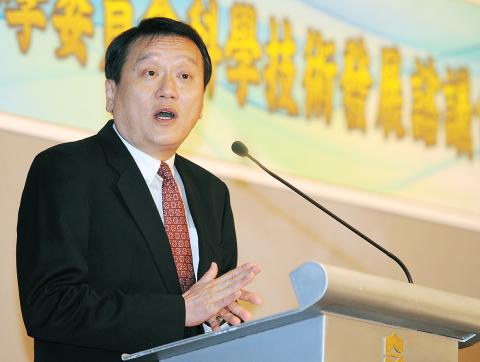The National Science Council initiated a conference yesterday in which scientific advisers to the council will discuss a growing brain drain crisis that is threatening Taiwan’s economic and technological development.
National Science Council Minister Cyrus Chu (朱敬一) said participants at the council’s two-day conference on developing science and technology will brainstorm on stopping the brain drain and also on how to better link academic research with the private sector.
Part of the problem, Chu said, is that many of the foreigners working in Taiwan are not highly skilled.

Photo: Liao Chen-huei, Taipei Times
Of the 450,000 foreign nationals who came to Taiwan to work last year, 400,000 were hired as blue-collar workers.
Most of the remaining white-collar workers were language teachers or involved in jobs that did not require technical skills or specialized knowledge, he said.
The conservative nature of Taiwanese society has also held up efforts to attract foreign professionals to work in Taiwan, he added, noting that few foreigners serve in decisionmaking positions in local companies.
At the same time, China’s aggressive efforts to recruit Taiwanese talent by offering high salaries is eroding Taiwan’s homegrown talent pool, Chu said.
On the eve of the conference, Chu raised the alarm over the brain drain, warning that Taiwan would “perish miserably” if it continued doing nothing to stop the country’s erosion of talent, according to local media reports.
The official said Taiwan has entered a “talent-gap era,” with fewer Taiwanese students going abroad for advanced studies and increasing difficulties in keeping talent at home or attracting top professionals from abroad, the Chinese-language United Daily News reported.
The Industrial Technology Research Institute, Taiwan’s top technology research agency, has already lost several senior executives to similar research organizations in China because it was unable to match China’s lucrative salary and benefits offers, Chu said.
To stop the drain, the minister said Taiwan should define “talent” and “workers” separately, and he suggested that caps on senior officials’ salaries at national research institutes should be lifted.
The government would use the conclusions from the conference as a reference when devising science and technology development strategies, the council said.

Alain Robert, known as the "French Spider-Man," praised Alex Honnold as exceptionally well-prepared after the US climber completed a free solo ascent of Taipei 101 yesterday. Robert said Honnold's ascent of the 508m-tall skyscraper in just more than one-and-a-half hours without using safety ropes or equipment was a remarkable achievement. "This is my life," he said in an interview conducted in French, adding that he liked the feeling of being "on the edge of danger." The 63-year-old Frenchman climbed Taipei 101 using ropes in December 2004, taking about four hours to reach the top. On a one-to-10 scale of difficulty, Robert said Taipei 101

Nipah virus infection is to be officially listed as a category 5 notifiable infectious disease in Taiwan in March, while clinical treatment guidelines are being formulated, the Centers for Disease Control (CDC) said yesterday. With Nipah infections being reported in other countries and considering its relatively high fatality rate, the centers on Jan. 16 announced that it would be listed as a notifiable infectious disease to bolster the nation’s systematic early warning system and increase public awareness, the CDC said. Bangladesh reported four fatal cases last year in separate districts, with three linked to raw date palm sap consumption, CDC Epidemic Intelligence

US climber Alex Honnold left Taiwan this morning a day after completing a free-solo ascent of Taipei 101, a feat that drew cheers from onlookers and gained widespread international attention. Honnold yesterday scaled the 101-story skyscraper without a rope or safety harness. The climb — the highest urban free-solo ascent ever attempted — took just more than 90 minutes and was streamed live on Netflix. It was covered by major international news outlets including CNN, the New York Times, the Guardian and the Wall Street Journal. As Honnold prepared to leave Taiwan today, he attracted a crowd when he and his wife, Sanni,

Taiwanese and US defense groups are collaborating to introduce deployable, semi-autonomous manufacturing systems for drones and components in a boost to the nation’s supply chain resilience. Taiwan’s G-Tech Optroelectronics Corp subsidiary GTOC and the US’ Aerkomm Inc on Friday announced an agreement with fellow US-based Firestorm Lab to adopt the latter’s xCell, a technology featuring 3D printers fitted in 6.1m container units. The systems enable aerial platforms and parts to be produced in high volumes from dispersed nodes capable of rapid redeployment, to minimize the risk of enemy strikes and to meet field requirements, they said. Firestorm chief technology officer Ian Muceus said